It would be easy enough to think of Utiel-Requena’s long winemaking history as if founded, quite literally, upon the intricate system of underground cellars that have, since the Middle Ages, been the very bowels of the region’s villages. Under each house one finds excavated cellars formed of room-size fermentation chambers – many of them lined with unlikely and beautiful combinations of refuse tiles – and of storage areas containing impressive amphorae. These imposing clay vessels, up to 1.80 metres tall and with more than one metre of maximum diameter, would often need to be installed before the completion of the house above or have special openings made for their placement. Walk through any of the nine villages of Utiel-Requena and you will see ventilation outlets along the pavements, evidence of the caves open underneath and still in use today.
Yet, the local winemaking tradition dates much further back. A visit to unique archeological sites reveals impressive, and quasi-magical, structures that allowed for the production of wine at almost industrial scale in the VII, VI and V centuries AD. If Iberian settlements elsewhere show vestigial proof of winemaking for self- consumption (adjacent or integrated in main sheltering structures), Requena’s ‘pilillas’ are purpose-built clusters for the wine production, storage and trade. They show an investment and complexity requiring a level of organisation and knowledge quite unique both in the Iberian and Mediterranean context. This in turn is also indicative of established viticultural practices, allowing for the consistent cultivation of vines and harvest of grapes. 2600 years of winemaking history that remain very much part of the region’s identity.
A region of the present, meeting of past and future
If today wine is the leading economic sector in the DO’s area, such is a product both of the commitment to such deep- rooted traditions and of the willingness to embrace experimentation and innovation. Utiel-Requena is, by merging the past and the future, a dynamic wine region of the present, willing to question assumptions and defy stereotypes while acknowledging its specific, and very strong, heritage.
Part of this capacity for reinvention based on tradition – which in the past couple of decades has seen both a dramatic increase in quality-focused boutique wineries and the consolidation of leading cooperatives – is based on a coexistence of generations. Growers have remained committed to their vineyards, passing on the knowledge only experience can give. On the other hand, Requena’s viticulture school (Escuela de Viticultura y Enología Félix Jiménez) has been, since its foundation in 1960, a unique institution of its kind and the place that formed most of Spain’s most renowned winemakers, creating a regenerative flow of young energy and technical expertise.
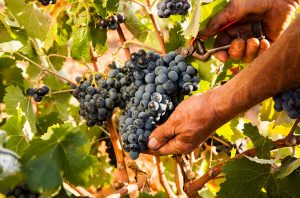
Tierras de Bobal -and much more
Under the ‘Tierras de Bobal’ programme, the region has been actively and systematically promoting its cultural, natural, historical and gastronomic wealth. The initiative has allowed for a comprehensive and integrated understanding of the territory, with Bobal as a symbol of how wine is inextricably linked to all of the region’s identity vectors.
Utiel-Requena is not, however, a monocultural landscape. Part of the singularity of the Tierras de Bobal is, precisely, the balance and beauty provided by biodiversity. Vineyards have coexisted alongside other crops as well as with well- preserved woodland, where the essence of the local landscape is visible and alive.
It’s not only with other species that Bobal shares this landscape with. Other grape varieties have found a home in Utiel-Requena, contributing to the stylistic diversity the region is capable of. Among them are important white varieties – Macabeo, Merseguera, Tardana – whose potential for character and quality is being both rediscovered and further developed.
Bobal does remain, still, the region’s calling card, all the more as it offers, in itself, such versatility without ever losing its character. Ongoing clonal investigation is looking at the phenotypic diversity of the local grape within old vineyard stock, with the aim of preserving the intrinsic wealth of genetic diversity.
Utiel-Requena at a glance
Located 80 km inland from Valencia, in central-eastern Spain
Granted DO status in 1932
Utiel-Requena’s towns and villages: Caudete de las Fuentes, Camporrobles, Fuenterrobles, Requena, Siete Aguas, Sinarcas, Utiel, Venta del Moro and Villargordo del Cabriel
Climate: Mediterranean with strong continental influence due to altitude (average 750m)
Area under vine (productive): 32.013 hectares
Main grape variety: Bobal, with 20.907 hectares planted, of which 9.368 are more than 45 years old
Other significant red varieties: Cabernet Sauvignon (399 ha), Garnacha (1.061 ha), Garnacha Tintorera (394 ha), Merlot (228 ha), Syrah (146 ha), Tempranillo (3.478 ha)
Significant white varieties: Chardonnay (463 ha), Macabeo (4.265 ha), Merseguera (55 ha), Tardana (296 ha), Sauvignon Blanc (127 ha)
Styles of wine produced: sparkling, white, rosé and red (red wines account for 67% of total production)
Categories: Joven, Superior, Madurado Barrica, Crianza, Reserva, Gran Reserva and Bobal Alta Expresión (a special mention for outstanding expressions of single-varietal Bobal)
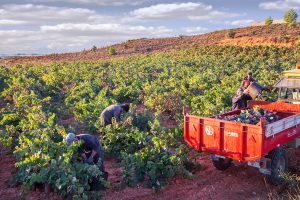
Character, versatility and collaboration
It’s not by chance that Utiel-Requena has long attracted winemaking talent from other regions, both within Spain and abroad. Even if first drawn by the prospect of producing wine with a lower upfront investment and by the local pool of expert labour, most are unexpectedly taken by a love for the uniqueness of Utiel-Requena.
It is hard not to be seduced by the Mediterranean light painting the rolling hills with impressionist hues, by the wind whispering on the pines, by the stately beauty of old vineyards or by, above all, the genuine warmth of the people, so closely linked to their land.
It’s from this closeness with land and vines that a unique form of lived experience stems, combined with actively sought technical expertise. And along with expertise comes character, competitiveness and versatility. It is at the crossroads of these three attributes that Utiel-Requena has been able to redefine itself since the turn of the century, welcoming young producers, new projects and a reappreciation of Bobal’s quality potential.
A future built upon the past
What of the challenges of the future? Utiel-Requena’s recent evolution has happened with an eye on the future, with a unique determination to be proactive and optimistic, without losing sight of the issues at hand. Generational change and labour availability being one of them – and one for which the region has built a particular resilience. As noted above, the local viticultural school has played a particularly important role. Other efforts have been made, by engaging high-school students and collaborating with the University of Valencia’s Gastronomic science department.
Another key challenge is climate change, for which Utiel-Requena is armed with a robust, natural toolkit. Late- ripening Bobal is able to withstand the growing pressure to reach phenolic maturation while keeping alcohol in check. As do the also indigenous white varieties Merseguera and (aptly-named) Tardana. The stock of old, well-adapted vines, with inherent resistance to extreme weather events and vintage variation, in tandem with the collaborative spirit of a community of experienced growers, are the other powerful tools with which Utiel-Requena can build confidence and resilience.
With a long winemaking history, so deeply inscribed in local history, architecture and economy, Utiel-Requena also finds itself in the privileged position of being a region for the future – wise, experienced but very young at heart.
12 Flagship DO Utiel-Requena producers to know
 Finca San Blas
Finca San Blas
San Blas is an environmental and philosophical, more than a farming, project: 600 hectares of forests, almond, hazelnut and olive trees and, of course, vines, that materialise a lived idea of biodiversity and natural balance. This same idea of harmony and natural complexity can also be used to describe the essential character of the estate’s wines, all of which convey a calm strength and an intense poise. The winery itself, nestled in the hills, shielded by walls of pines, embodies these same principles. Finca San Blas is, above all, a project of attention and listening to nature and its infinite secrets.
Read more about the story and wines of Finca San Blas
 Montesanco
Montesanco
Led by a passionate husband-and-wife team, Montesanco is indeed a project of love: for the land of Utiel-Requena, for its indigenous grapes and for ‘the good life’. María Sancho and Paco Cotino took over a quasi-abandoned winery surrounded by rolling hills and old vines of Bobal, and embarked on a brave project of recovery that condenses the finca’s energy and history. Unapologetic about favouring a more traditional, robust style of wines, the couple produces a Characterful range that speaks of their personalities as much as of the beauty of the landscape they adopted.
Read more about the story and wines of Montesanco
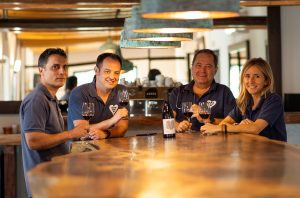
Finca Cor Ví
Located within the perimeter of the Hoces del Cabriel Natural Park, Finca Cor Ví is a privileged part of one of Europe’s most unspoiled landscapes. Pure water, clean air, starry skies, silence and no wifi signal (!), make it a haven of biodiversity, where sustainable viticulture is not a choice – it is quite simply the natural way of this land. This same purity and unpretentiousness is reflected in Cor Ví’s wines and its wine tourism project, both an invitation to discover the very essence of Utiel-Requena.
Read more about the story and wines of Finca Cor Ví
 Grupo Coviñas
Grupo Coviñas
Harnessing the power and passion of its 3000 members, Coviñas is an exemplary cooperative, driven by quality, strong ethics and unparalleled professionalism. It has long been an essential driving force of the region as a whole, setting an example of cooperation and promoting the firm belief on the unique (and shared) viticultural patrimony that makes Utiel-Requena so special. Its range covers an array of price points and styles, all with the same attention to detail and quality.
Read more about the story and wines of Grupo Coviñas
 Pago de Tharsys
Pago de Tharsys
The origins of Pago de Tharsys date back to 1808, when its original cellar was excavated into the limestone bedrock. In 1991, when Ana Suria and Vicente García rebuilt the property, the modern history of Tharsys began: an exciting revival that ushered the estate to the 21st as one of the region’s leading producers. Today, Pago de Tharsys has a group of talented women at its helm, infusing the estate’s wines with feminine strength.
Read more about the story and wines of Pago de Tharsys
 Chozas Carrascal
Chozas Carrascal
A family project, now in the hands of second generation Mariá José and Julián. The siblings have led its expansion from
25 to 100 hectares, all farmed organically. The estate owns impressive historical vines, including centennial Bobal plants, that provide the raw material for expressive wines in which acidity, freshness and texture play the central roles. Modern classics in the making.
Read more about the story and wines of Chozas Carrascal [coming soon]
 Dominio de La Vega
Dominio de La Vega
Animated by a cross-generational energy, Dominio de La Vega builds upon tradition while driven by a will to innovate. The company has invested in research and development, contributing not only to the increasing quality of its wines but also to the pool of resources available to the whole region. With a growing focus on sustainability, the wines of Dominio de La Vega combine a classic poise, evocative of tradition, with a modern texture.
Read more about the story and wines of Dominio de La Vega [coming soon]
 Bodegas Vibe
Bodegas Vibe
Bodegas Vibe was born out of a love for the unique food and wine traditions of Utiel-Requena. With a long experience in hospitality, the Vicente family partnered with a talented winemaker to bring their project of passion to life. Each wine pays tribute to the flavours of this corner of the Mediterranean, with a particularly firm belief in Bobal and Tardana as the varieties that best express the essence of the region.
Read more about the story and wines of Bodegas Vibe [coming soon]
 Vegalfaro
Vegalfaro
Founded by father-and-son team Andrés and Rodolfo Valiente in 1999, Vegalfaro has since defined a very personal style, reflective of Rodolfo’s focus on terroir expression and sustainability. The property’s 60 hectares are farmed organically and managed under biodynamic principles. As champions of the local varieties and mindful viticulture, Vegalfaro have a no-nonsense approach to winemaking, allowing the landscape and grapes to speak for themselves.
Read more about the story and wines of Vegalfaro [coming soon]
 BVC
BVC
Valérie Bataille and Benoit Calvet fell in love with Utiel-Requena and, in 2014, created a sibling company to their longstanding Bordeaux-based project. The couple was looking for unspoiled landscapes and winemaking traditions, and that’s exactly what they found. They work closely with Grupo Coviñas and their growers to produce some of the most successful wines bearing the DO Utiel-Requena stamp.
Read more about the story and wines of BVC [coming soon]
 Vera de Estenas
Vera de Estenas
The greatest lesson Félix Martínez Roda learnt from his father, Francisco Martínez Bermell, was that ‘there are no secrets, there’s simply the need to love wine.’ This remains the main principle inspiring the family estate, guided by an unfailing commitment to Utiel-Requena and to Bobal. Vera de Estena’s library cellar has some of the oldest examples of the variety, proving its potential for fine development. The legacy continues.
Read more about the story and wines of Vera de Estenas [coming soon]
 Faustino Rivero Ulecia
Faustino Rivero Ulecia
For five generations the Rivero family has pioneered the production of quality wines in key Spanish wine regions. The adventure started in Rioja and expanded to the Basque Country, Galicia and Catalonia, before arriving to Utiel-Requena. Since finding its home in the land of Bobal, the wines of Faustino Rivero Ulecia have shown the variety’s versatility, character and expressiveness across styles.
Read more about the story and wines of Faustino Rivero Ulecia [coming soon]



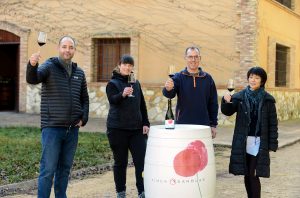 Finca San Blas
Finca San Blas Montesanco
Montesanco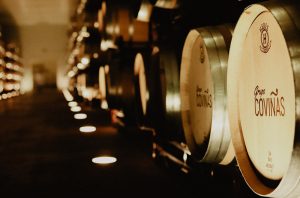 Grupo Coviñas
Grupo Coviñas Pago de Tharsys
Pago de Tharsys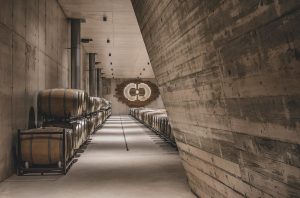 Chozas Carrascal
Chozas Carrascal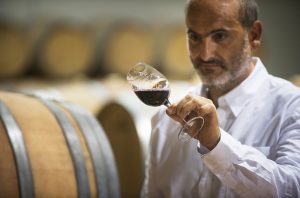 Dominio de La Vega
Dominio de La Vega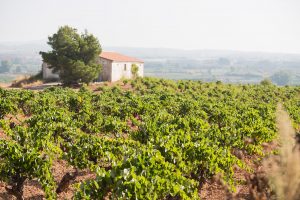 Bodegas Vibe
Bodegas Vibe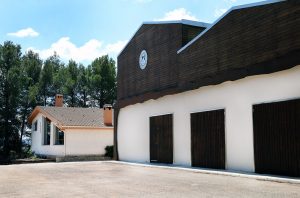 Vegalfaro
Vegalfaro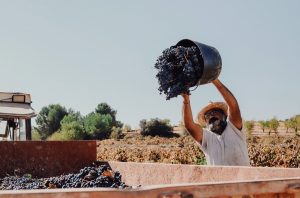 BVC
BVC Vera de Estenas
Vera de Estenas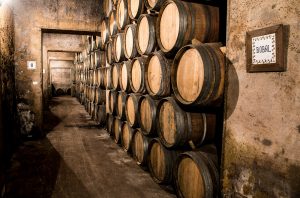 Faustino Rivero Ulecia
Faustino Rivero Ulecia



